2022届高考英语二轮复习:情态动词和虚拟语气课件(30张)
文档属性
| 名称 | 2022届高考英语二轮复习:情态动词和虚拟语气课件(30张) |

|
|
| 格式 | zip | ||
| 文件大小 | 338.7KB | ||
| 资源类型 | 教案 | ||
| 版本资源 | 通用版 | ||
| 科目 | 英语 | ||
| 更新时间 | 2022-05-06 16:12:43 | ||
图片预览

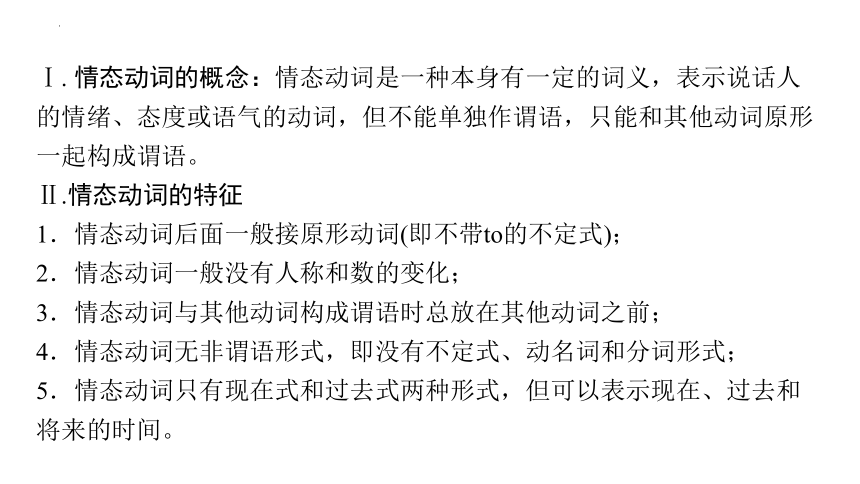
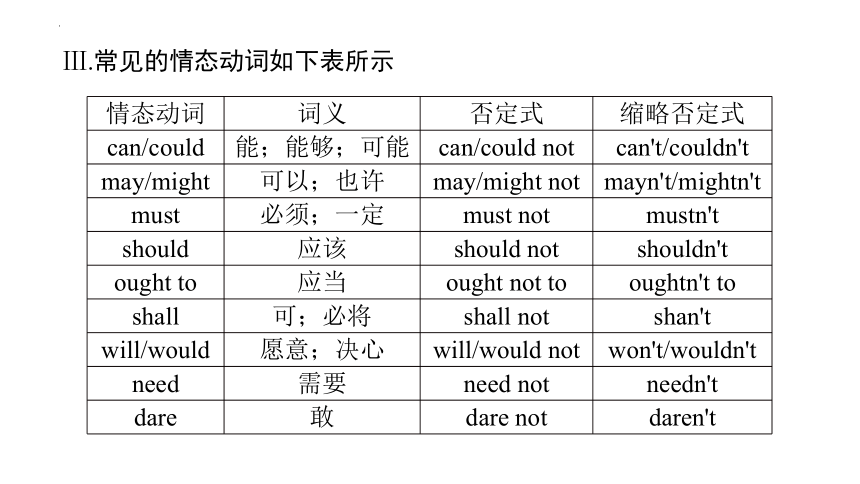
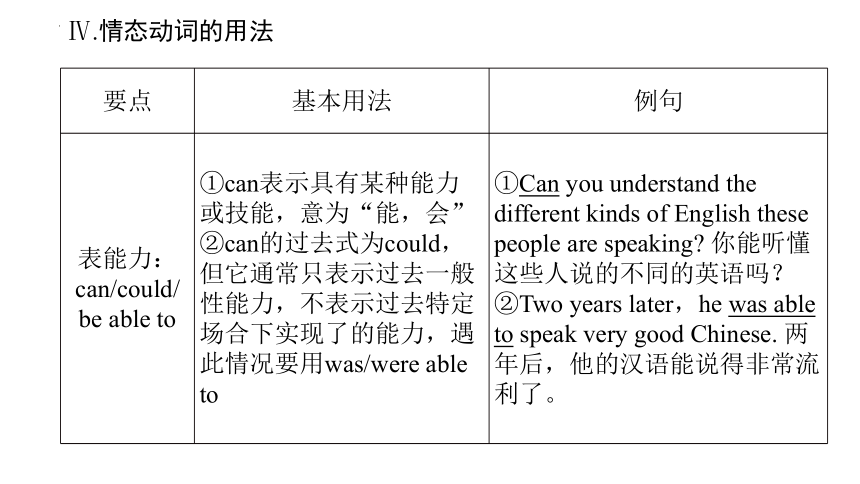
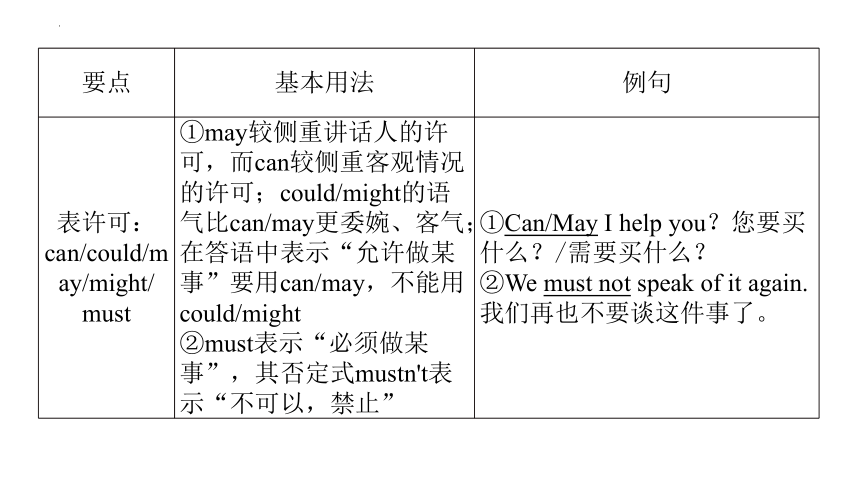
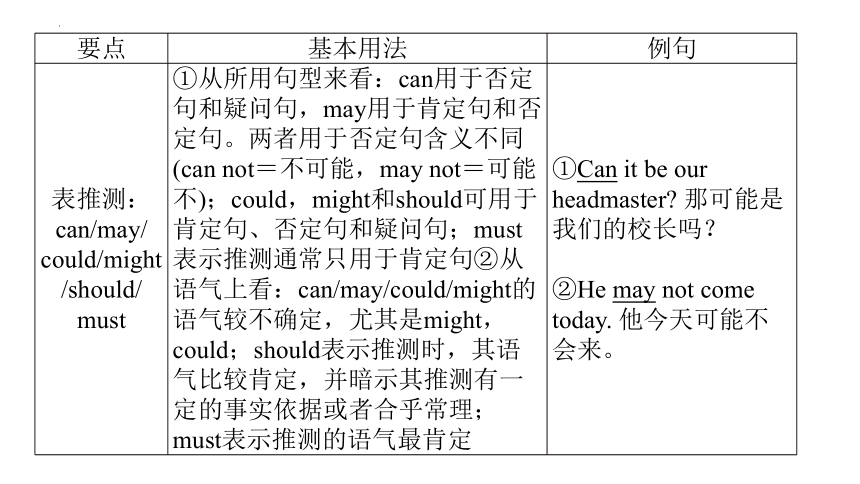
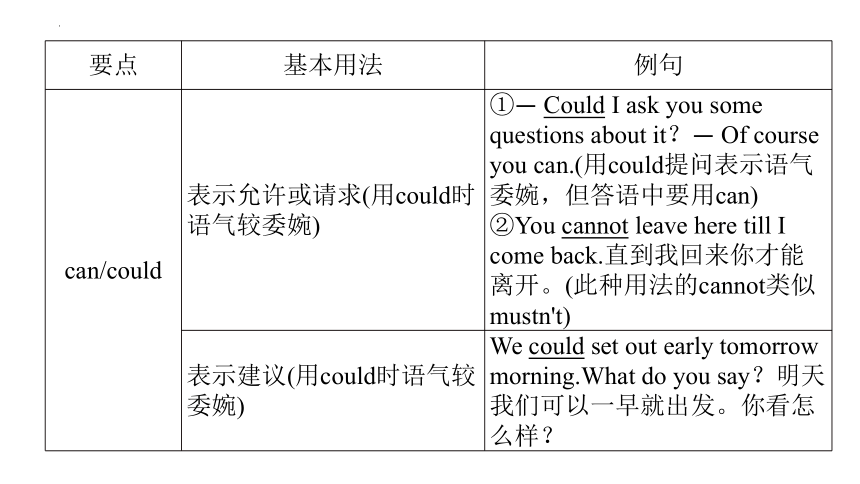

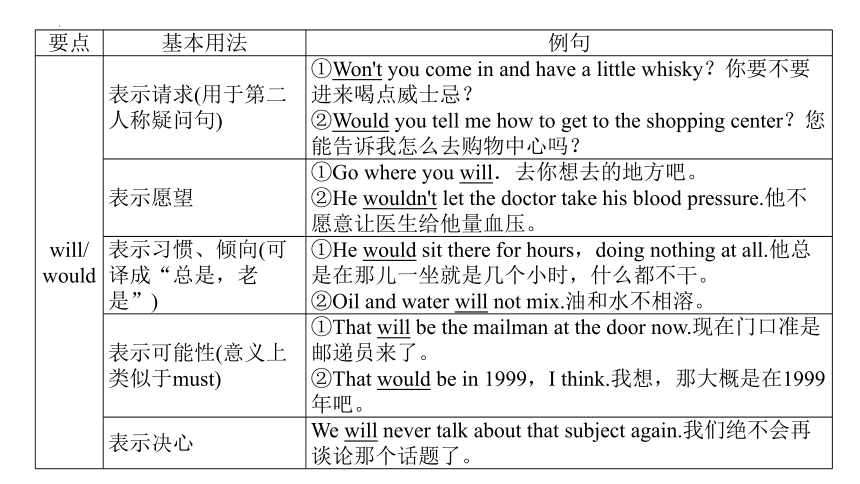
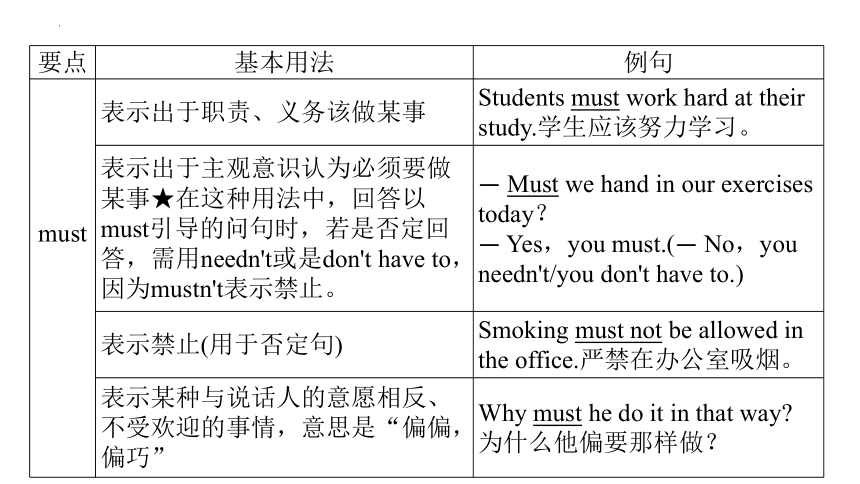

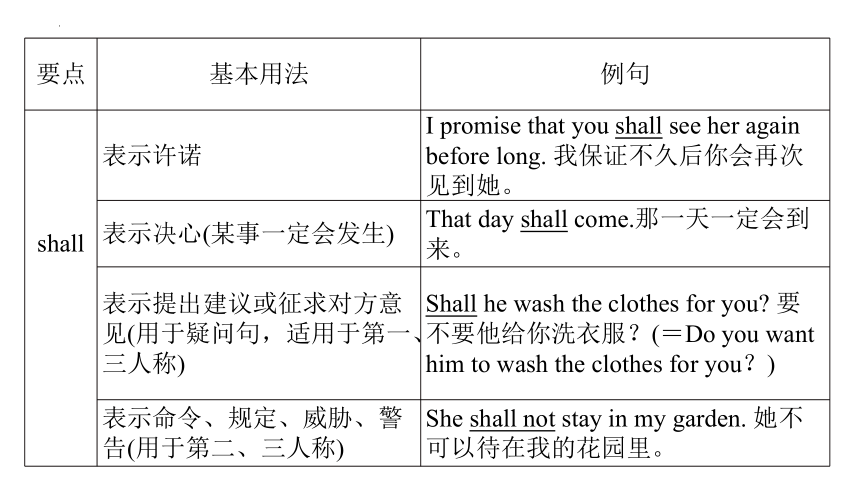
文档简介
(共30张PPT)
情态动词和虚拟语气
Ⅰ. 情态动词的概念:情态动词是一种本身有一定的词义,表示说话人的情绪、态度或语气的动词,但不能单独作谓语,只能和其他动词原形一起构成谓语。
Ⅱ.情态动词的特征
1.情态动词后面一般接原形动词(即不带to的不定式);
2.情态动词一般没有人称和数的变化;
3.情态动词与其他动词构成谓语时总放在其他动词之前;
4.情态动词无非谓语形式,即没有不定式、动名词和分词形式;
5.情态动词只有现在式和过去式两种形式,但可以表示现在、过去和将来的时间。
Ⅲ.常见的情态动词如下表所示
情态动词 词义 否定式 缩略否定式
can/could 能;能够;可能 can/could not can't/couldn't
may/might 可以;也许 may/might not mayn't/mightn't
must 必须;一定 must not mustn't
should 应该 should not shouldn't
ought to 应当 ought not to oughtn't to
shall 可;必将 shall not shan't
will/would 愿意;决心 will/would not won't/wouldn't
need 需要 need not needn't
dare 敢 dare not daren't
Ⅳ.情态动词的用法
要点 基本用法 例句
表能力:can/could/ be able to ①can表示具有某种能力或技能,意为“能,会” ②can的过去式为could,但它通常只表示过去一般性能力,不表示过去特定场合下实现了的能力,遇此情况要用was/were able to ①Can you understand the different kinds of English these people are speaking 你能听懂这些人说的不同的英语吗?②Two years later,he was able to speak very good Chinese. 两年后,他的汉语能说得非常流利了。
要点 基本用法 例句
表许可:can/could/may/might/ must ①may较侧重讲话人的许可,而can较侧重客观情况的许可;could/might的语气比can/may更委婉、客气;在答语中表示“允许做某事”要用can/may,不能用could/might ②must表示“必须做某事”,其否定式mustn't表示“不可以,禁止” ①Can/May I help you?您要买什么?/需要买什么?
②We must not speak of it again.我们再也不要谈这件事了。
要点 基本用法 例句
表推测:can/may/ could/might/should/ must ①从所用句型来看:can用于否定句和疑问句,may用于肯定句和否定句。两者用于否定句含义不同(can not=不可能,may not=可能不);could,might和should可用于肯定句、否定句和疑问句;must表示推测通常只用于肯定句②从语气上看:can/may/could/might的语气较不确定,尤其是might,could;should表示推测时,其语气比较肯定,并暗示其推测有一定的事实依据或者合乎常理;must表示推测的语气最肯定 ①Can it be our headmaster 那可能是我们的校长吗?
②He may not come today. 他今天可能不会来。
要点 基本用法 例句
can/could 表示允许或请求(用could时语气较委婉) ①— Could I ask you some questions about it?— Of course you can.(用could提问表示语气委婉,但答语中要用can)
②You cannot leave here till I come back.直到我回来你才能离开。(此种用法的cannot类似mustn't)
表示建议(用could时语气较委婉) We could set out early tomorrow morning.What do you say?明天我们可以一早就出发。你看怎么样?
要点 基本用法 例句
may/might 表示可能性(用于肯定句和否定句) I may be busy from tomorrow on. 从明天起我可能会忙起来。
表示允许或请求(用might时语气较委婉) ①May I come in?我可以进来吗?②Might I use the telephone?我可以用一下电话吗?
may表示祝愿 May you continue in your efforts and achieve greater success.祝愿你继续努力并取得更大的成功。
要点 基本用法 例句
will/ would 表示请求(用于第二人称疑问句) ①Won't you come in and have a little whisky?你要不要进来喝点威士忌?
②Would you tell me how to get to the shopping center?您能告诉我怎么去购物中心吗?
表示愿望 ①Go where you will.去你想去的地方吧。
②He wouldn't let the doctor take his blood pressure.他不愿意让医生给他量血压。
表示习惯、倾向(可译成“总是,老是”) ①He would sit there for hours,doing nothing at all.他总是在那儿一坐就是几个小时,什么都不干。
②Oil and water will not mix.油和水不相溶。
表示可能性(意义上类似于must) ①That will be the mailman at the door now.现在门口准是邮递员来了。
②That would be in 1999,I think.我想,那大概是在1999年吧。
表示决心 We will never talk about that subject again.我们绝不会再谈论那个话题了。
要点 基本用法 例句
must 表示出于职责、义务该做某事 Students must work hard at their study.学生应该努力学习。
表示出于主观意识认为必须要做某事★在这种用法中,回答以must引导的问句时,若是否定回答,需用needn't或是don't have to,因为mustn't表示禁止。 — Must we hand in our exercises today?
— Yes,you must.(— No,you needn't/you don't have to.)
表示禁止(用于否定句) Smoking must not be allowed in the office.严禁在办公室吸烟。
表示某种与说话人的意愿相反、不受欢迎的事情,意思是“偏偏,偏巧” Why must he do it in that way 为什么他偏要那样做?
要点 基本用法 例句
need/dare ①need和dare用作情态动词时,主要用于否定句、疑问句和条件状语从句中,没有人称和数的变化,后接动词要用动词原形②need和dare用作实义动词时,后接动词要用不定式,有人称和数的变化,在肯定句、否定句和疑问句中都可以使用,并且need作实义动词“需要”解,后接动名词相当于不定式的被动式 ①You needn't worry.你不必担心。
②Need I answer the question 我需要回答问题吗?
③I daren't tell her the truth. 我不敢告诉她事实。
④She doesn't dare to meet her teacher's eyes.她不敢面对她老师的目光。
⑤The house needs repairing. =The house needs to be repaired. 房屋需要维修。
要点 基本用法 例句
shall 表示许诺 I promise that you shall see her again before long. 我保证不久后你会再次见到她。
表示决心(某事一定会发生) That day shall come.那一天一定会到来。
表示提出建议或征求对方意见(用于疑问句,适用于第一、三人称) Shall he wash the clothes for you 要不要他给你洗衣服?(=Do you want him to wash the clothes for you?)
表示命令、规定、威胁、警告(用于第二、三人称) She shall not stay in my garden. 她不可以待在我的花园里。
1.must/have to
(1)must表示主观上 “必须, 一定要”; have to强调来自 “外界” 的义务, 即表示 “不得不”。
(2)mustn't用来表示禁止, don't have to表示没有义务、没有必要做。
重点一 情态动词考点
2.used to/be used to
(1)used to表示 “过去常常”, 没有人称和数的变化, 可以与过去的时间状语连用, 其否定形式为usedn't to 或 didn't use to, 其一般疑问句形式将used 提到主语前或用Did...use to...形式。
(2)be used to多用来表示 “习惯于”, to是介词, 其后接名词、代词或动词-ing形式。
3.情态动词+be+doing
表示对现在和将来正在进行的行为进行推测, 意为“或许正在, 应当正在, 想必正在, 准是正在”。
4.情态动词+have+动词过去分词
情态动词+have+动词过去分词 含义和用法
must have+动词过去分词 过去一定做过……(肯定句)
can/could (not) have+动词过去分词 过去可能做过……(肯定句)
过去不可能做过……(否定句)
could have+动词过去分词 本来能够做但却未做(肯定句)
may/might (not) have+动词过去分词 过去可能做过……(肯定句)
过去可能没有做过……(否定句)
should/ought (not) to have+动词过去分词 本来应该做但是实际上未做……(肯定句)
本来不应该做而实际上做了……(否定句)
needn't have+动词过去分词 没必要做而做了……
We (face)the difficulty together, but why didn't you tell me
我们本来可以一起面对困难, 但是你为什么不告诉我
Mark (hurry). After driving at top speed, he arrived half an hour early.
马克本不必着急。他开快车后, 早到了半小时。
could have faced
needn’t have hurried
5.情态动词的特殊句式
(1)cannot help but do表示 “不得不” 之意。
(2)can't help doing sth表示 “禁不住做某事”。
(3)can't help (to) do表示 “不能帮忙做某事”。
(4)cannot/never...too...表示 “无论怎样……都不过分, 越……越好”。
(5)may/might as well表示有礼貌的劝告, 意为 “还是……的好, 不妨……”。
(6)if you must...表示不想让某人做某事但也没办法, 意为 “非要, 一定要……”。
1.虚拟语气在非真实条件句中的应用
条件 从句谓语 主句谓语 例句
与现在事实相反 过去式(be动词用were) would/should/could/might+动词原形 If I (be)you, I (seize) the chance.
与过去事实相反 had+动词过去分词 would/should/could/might+have+动词过去分词 If you (take) my advice, you (fail).
重点二 虚拟语气
were
would seize
had taken
wouldn’t have failed
条件 从句谓语 主句谓语 例句
与将来事实相反 ①过去式 ②should+动词原形 ③were to+动词原形 would/should/could/might+动词原形 If he (come) tomorrow, we would put off the meeting.
came/should come/were to come
2.虚拟条件句的特殊用法
(1)如果条件句谓语含有were, had, should, 可以将if省略, 再把were, should, had移到主语之前; 如果从句中没有were, should或had, 则不能省略if。
(2)but for(要不是), without(要是没有)表示条件, 谓语动词要用虚拟语气。
3.虚拟语气在从句中的应用
(1)虚拟语气用在wish, if only, as if/though后的从句中
条件 从句谓语 例句
从句谓语动作与主句谓语动作同时发生 过去式(be动词用were) How I wish I (be) a flying bird!
He looks as if he (be) an artist.
were
was
条件 从句谓语 例句
从句谓语动作先于主句谓语动作发生 had+动词过去分词 If only I (see) the film!
=How I wish I had seen the film!
She speaks English so fluently as if she (stay) in America for a long time.
从句谓语动作后于主句谓语动作发生 would+动词原形 He learns English so hard as if he (go) to the U.S.A.
had seen
had stayed
would go
(2)虚拟语气用在主句含 “坚持、命令、建议、要求” 的名词性从句中
类别 从句谓语 例句
一坚持: insist should+动词原形(should可以省略) He suggested that we (should) start off early the next day.
His suggestion was that we (should) start off early the next day.
It was suggested that we (should) start off early the next day.
二命令: order, command
三个建议: advise, suggest, propose,
四要求: require, request, demand, ask
提示:
suggest做 “暗示, 表明” 讲, insist做 “坚持说” 讲, 后面宾语从句的谓语动词不使用虚拟语气形式, 而使用陈述语气。
The smile on his face suggested that he (be) satisfied with our work.
The man insisted that he had never stolen the money.
was
(3)虚拟语气用在 “would rather+that从句” 中
条件 从句谓语 例句
对现在或将来的虚拟 过去式(be动词用were) I'd rather they didn't hear of the news.
对过去的虚拟 had+动词过去分词 I'd rather I had not told him the bad news.
(4)虚拟语气用在 “It is (high) time+that从句” 中
that从句谓语 例句
过去式 It is (high) time that you went to school.
Ⅰ.在空白处填入适当的内容(1个单词)或括号内单词的正确形式1.My room is a mess, but I ________ clean it before I go out tonight. I can do it in the morning.2.Why didn't you tell me about your trouble last week If you _________ (tell) me, I could have helped.3.________ (be) it not for the support of the teachers, the student could not overcome her difficulty.4.You ________ be careful with the camera. It costs!
needn't
had told
Were
must
5.I still remember my happy childhood when my mother ________ take me to Disneyland at weekends.6.Life is unpredictable; even the poorest ____________ become the richest.7.The door __________ open, no matter how hard she pushed.8.Since nobody gave him any help, he ________ have done the research on his own.9.I ________________________ (go) to my cousin's birthday party last night, but I was not available.10.My mom suggests that we ________ eat out for a change this weekend.
would
may/might
wouldn't
must
would/should have gone
should
11.Had the governments and scientists not worked together, AIDS related deaths ____________________ (not fall) since their highest in 2005.12.—Do you have Betty's phone number —Yes. Otherwise, I _________________ (be) able to reach her yesterday.13.Jack is a great talker. It's high time that he _____________ (do) something instead of just talking.14.Don't handle the vase as if it _____ (be) made of steel.15.We would have called a taxi yesterday if Harold _____________ (offer) us a ride home.
would not have fallen
wouldn't have been
did/should do
were
hadn't offered
THANK YOU !
情态动词和虚拟语气
Ⅰ. 情态动词的概念:情态动词是一种本身有一定的词义,表示说话人的情绪、态度或语气的动词,但不能单独作谓语,只能和其他动词原形一起构成谓语。
Ⅱ.情态动词的特征
1.情态动词后面一般接原形动词(即不带to的不定式);
2.情态动词一般没有人称和数的变化;
3.情态动词与其他动词构成谓语时总放在其他动词之前;
4.情态动词无非谓语形式,即没有不定式、动名词和分词形式;
5.情态动词只有现在式和过去式两种形式,但可以表示现在、过去和将来的时间。
Ⅲ.常见的情态动词如下表所示
情态动词 词义 否定式 缩略否定式
can/could 能;能够;可能 can/could not can't/couldn't
may/might 可以;也许 may/might not mayn't/mightn't
must 必须;一定 must not mustn't
should 应该 should not shouldn't
ought to 应当 ought not to oughtn't to
shall 可;必将 shall not shan't
will/would 愿意;决心 will/would not won't/wouldn't
need 需要 need not needn't
dare 敢 dare not daren't
Ⅳ.情态动词的用法
要点 基本用法 例句
表能力:can/could/ be able to ①can表示具有某种能力或技能,意为“能,会” ②can的过去式为could,但它通常只表示过去一般性能力,不表示过去特定场合下实现了的能力,遇此情况要用was/were able to ①Can you understand the different kinds of English these people are speaking 你能听懂这些人说的不同的英语吗?②Two years later,he was able to speak very good Chinese. 两年后,他的汉语能说得非常流利了。
要点 基本用法 例句
表许可:can/could/may/might/ must ①may较侧重讲话人的许可,而can较侧重客观情况的许可;could/might的语气比can/may更委婉、客气;在答语中表示“允许做某事”要用can/may,不能用could/might ②must表示“必须做某事”,其否定式mustn't表示“不可以,禁止” ①Can/May I help you?您要买什么?/需要买什么?
②We must not speak of it again.我们再也不要谈这件事了。
要点 基本用法 例句
表推测:can/may/ could/might/should/ must ①从所用句型来看:can用于否定句和疑问句,may用于肯定句和否定句。两者用于否定句含义不同(can not=不可能,may not=可能不);could,might和should可用于肯定句、否定句和疑问句;must表示推测通常只用于肯定句②从语气上看:can/may/could/might的语气较不确定,尤其是might,could;should表示推测时,其语气比较肯定,并暗示其推测有一定的事实依据或者合乎常理;must表示推测的语气最肯定 ①Can it be our headmaster 那可能是我们的校长吗?
②He may not come today. 他今天可能不会来。
要点 基本用法 例句
can/could 表示允许或请求(用could时语气较委婉) ①— Could I ask you some questions about it?— Of course you can.(用could提问表示语气委婉,但答语中要用can)
②You cannot leave here till I come back.直到我回来你才能离开。(此种用法的cannot类似mustn't)
表示建议(用could时语气较委婉) We could set out early tomorrow morning.What do you say?明天我们可以一早就出发。你看怎么样?
要点 基本用法 例句
may/might 表示可能性(用于肯定句和否定句) I may be busy from tomorrow on. 从明天起我可能会忙起来。
表示允许或请求(用might时语气较委婉) ①May I come in?我可以进来吗?②Might I use the telephone?我可以用一下电话吗?
may表示祝愿 May you continue in your efforts and achieve greater success.祝愿你继续努力并取得更大的成功。
要点 基本用法 例句
will/ would 表示请求(用于第二人称疑问句) ①Won't you come in and have a little whisky?你要不要进来喝点威士忌?
②Would you tell me how to get to the shopping center?您能告诉我怎么去购物中心吗?
表示愿望 ①Go where you will.去你想去的地方吧。
②He wouldn't let the doctor take his blood pressure.他不愿意让医生给他量血压。
表示习惯、倾向(可译成“总是,老是”) ①He would sit there for hours,doing nothing at all.他总是在那儿一坐就是几个小时,什么都不干。
②Oil and water will not mix.油和水不相溶。
表示可能性(意义上类似于must) ①That will be the mailman at the door now.现在门口准是邮递员来了。
②That would be in 1999,I think.我想,那大概是在1999年吧。
表示决心 We will never talk about that subject again.我们绝不会再谈论那个话题了。
要点 基本用法 例句
must 表示出于职责、义务该做某事 Students must work hard at their study.学生应该努力学习。
表示出于主观意识认为必须要做某事★在这种用法中,回答以must引导的问句时,若是否定回答,需用needn't或是don't have to,因为mustn't表示禁止。 — Must we hand in our exercises today?
— Yes,you must.(— No,you needn't/you don't have to.)
表示禁止(用于否定句) Smoking must not be allowed in the office.严禁在办公室吸烟。
表示某种与说话人的意愿相反、不受欢迎的事情,意思是“偏偏,偏巧” Why must he do it in that way 为什么他偏要那样做?
要点 基本用法 例句
need/dare ①need和dare用作情态动词时,主要用于否定句、疑问句和条件状语从句中,没有人称和数的变化,后接动词要用动词原形②need和dare用作实义动词时,后接动词要用不定式,有人称和数的变化,在肯定句、否定句和疑问句中都可以使用,并且need作实义动词“需要”解,后接动名词相当于不定式的被动式 ①You needn't worry.你不必担心。
②Need I answer the question 我需要回答问题吗?
③I daren't tell her the truth. 我不敢告诉她事实。
④She doesn't dare to meet her teacher's eyes.她不敢面对她老师的目光。
⑤The house needs repairing. =The house needs to be repaired. 房屋需要维修。
要点 基本用法 例句
shall 表示许诺 I promise that you shall see her again before long. 我保证不久后你会再次见到她。
表示决心(某事一定会发生) That day shall come.那一天一定会到来。
表示提出建议或征求对方意见(用于疑问句,适用于第一、三人称) Shall he wash the clothes for you 要不要他给你洗衣服?(=Do you want him to wash the clothes for you?)
表示命令、规定、威胁、警告(用于第二、三人称) She shall not stay in my garden. 她不可以待在我的花园里。
1.must/have to
(1)must表示主观上 “必须, 一定要”; have to强调来自 “外界” 的义务, 即表示 “不得不”。
(2)mustn't用来表示禁止, don't have to表示没有义务、没有必要做。
重点一 情态动词考点
2.used to/be used to
(1)used to表示 “过去常常”, 没有人称和数的变化, 可以与过去的时间状语连用, 其否定形式为usedn't to 或 didn't use to, 其一般疑问句形式将used 提到主语前或用Did...use to...形式。
(2)be used to多用来表示 “习惯于”, to是介词, 其后接名词、代词或动词-ing形式。
3.情态动词+be+doing
表示对现在和将来正在进行的行为进行推测, 意为“或许正在, 应当正在, 想必正在, 准是正在”。
4.情态动词+have+动词过去分词
情态动词+have+动词过去分词 含义和用法
must have+动词过去分词 过去一定做过……(肯定句)
can/could (not) have+动词过去分词 过去可能做过……(肯定句)
过去不可能做过……(否定句)
could have+动词过去分词 本来能够做但却未做(肯定句)
may/might (not) have+动词过去分词 过去可能做过……(肯定句)
过去可能没有做过……(否定句)
should/ought (not) to have+动词过去分词 本来应该做但是实际上未做……(肯定句)
本来不应该做而实际上做了……(否定句)
needn't have+动词过去分词 没必要做而做了……
We (face)the difficulty together, but why didn't you tell me
我们本来可以一起面对困难, 但是你为什么不告诉我
Mark (hurry). After driving at top speed, he arrived half an hour early.
马克本不必着急。他开快车后, 早到了半小时。
could have faced
needn’t have hurried
5.情态动词的特殊句式
(1)cannot help but do表示 “不得不” 之意。
(2)can't help doing sth表示 “禁不住做某事”。
(3)can't help (to) do表示 “不能帮忙做某事”。
(4)cannot/never...too...表示 “无论怎样……都不过分, 越……越好”。
(5)may/might as well表示有礼貌的劝告, 意为 “还是……的好, 不妨……”。
(6)if you must...表示不想让某人做某事但也没办法, 意为 “非要, 一定要……”。
1.虚拟语气在非真实条件句中的应用
条件 从句谓语 主句谓语 例句
与现在事实相反 过去式(be动词用were) would/should/could/might+动词原形 If I (be)you, I (seize) the chance.
与过去事实相反 had+动词过去分词 would/should/could/might+have+动词过去分词 If you (take) my advice, you (fail).
重点二 虚拟语气
were
would seize
had taken
wouldn’t have failed
条件 从句谓语 主句谓语 例句
与将来事实相反 ①过去式 ②should+动词原形 ③were to+动词原形 would/should/could/might+动词原形 If he (come) tomorrow, we would put off the meeting.
came/should come/were to come
2.虚拟条件句的特殊用法
(1)如果条件句谓语含有were, had, should, 可以将if省略, 再把were, should, had移到主语之前; 如果从句中没有were, should或had, 则不能省略if。
(2)but for(要不是), without(要是没有)表示条件, 谓语动词要用虚拟语气。
3.虚拟语气在从句中的应用
(1)虚拟语气用在wish, if only, as if/though后的从句中
条件 从句谓语 例句
从句谓语动作与主句谓语动作同时发生 过去式(be动词用were) How I wish I (be) a flying bird!
He looks as if he (be) an artist.
were
was
条件 从句谓语 例句
从句谓语动作先于主句谓语动作发生 had+动词过去分词 If only I (see) the film!
=How I wish I had seen the film!
She speaks English so fluently as if she (stay) in America for a long time.
从句谓语动作后于主句谓语动作发生 would+动词原形 He learns English so hard as if he (go) to the U.S.A.
had seen
had stayed
would go
(2)虚拟语气用在主句含 “坚持、命令、建议、要求” 的名词性从句中
类别 从句谓语 例句
一坚持: insist should+动词原形(should可以省略) He suggested that we (should) start off early the next day.
His suggestion was that we (should) start off early the next day.
It was suggested that we (should) start off early the next day.
二命令: order, command
三个建议: advise, suggest, propose,
四要求: require, request, demand, ask
提示:
suggest做 “暗示, 表明” 讲, insist做 “坚持说” 讲, 后面宾语从句的谓语动词不使用虚拟语气形式, 而使用陈述语气。
The smile on his face suggested that he (be) satisfied with our work.
The man insisted that he had never stolen the money.
was
(3)虚拟语气用在 “would rather+that从句” 中
条件 从句谓语 例句
对现在或将来的虚拟 过去式(be动词用were) I'd rather they didn't hear of the news.
对过去的虚拟 had+动词过去分词 I'd rather I had not told him the bad news.
(4)虚拟语气用在 “It is (high) time+that从句” 中
that从句谓语 例句
过去式 It is (high) time that you went to school.
Ⅰ.在空白处填入适当的内容(1个单词)或括号内单词的正确形式1.My room is a mess, but I ________ clean it before I go out tonight. I can do it in the morning.2.Why didn't you tell me about your trouble last week If you _________ (tell) me, I could have helped.3.________ (be) it not for the support of the teachers, the student could not overcome her difficulty.4.You ________ be careful with the camera. It costs!
needn't
had told
Were
must
5.I still remember my happy childhood when my mother ________ take me to Disneyland at weekends.6.Life is unpredictable; even the poorest ____________ become the richest.7.The door __________ open, no matter how hard she pushed.8.Since nobody gave him any help, he ________ have done the research on his own.9.I ________________________ (go) to my cousin's birthday party last night, but I was not available.10.My mom suggests that we ________ eat out for a change this weekend.
would
may/might
wouldn't
must
would/should have gone
should
11.Had the governments and scientists not worked together, AIDS related deaths ____________________ (not fall) since their highest in 2005.12.—Do you have Betty's phone number —Yes. Otherwise, I _________________ (be) able to reach her yesterday.13.Jack is a great talker. It's high time that he _____________ (do) something instead of just talking.14.Don't handle the vase as if it _____ (be) made of steel.15.We would have called a taxi yesterday if Harold _____________ (offer) us a ride home.
would not have fallen
wouldn't have been
did/should do
were
hadn't offered
THANK YOU !
